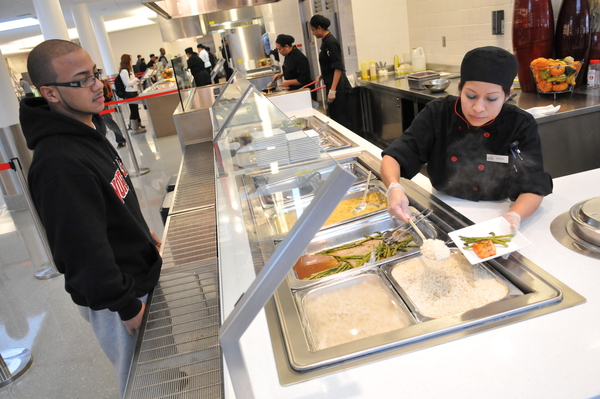Northeastern gets ‘Real’ with commitment to serving sustainable food

Northeastern University is Boston’s first higher education institution to join the Real Food Challenge, a national campaign through which colleges and universities pledge to purchase at least 20 percent of their food from local, fair, and sustainable sources by 2020. President Joseph E. Aoun recently broke the news via Twitter.
The Real Food Challenge—which began as an independent, self-funded program of The Food Project, a Boston-based nonprofit organization—strives to harness the power of youth and universities to build a healthy, fair, and green food economy.
Northeastern’s participation in the Real Food Challenge continues its longstanding commitment to sustainability and Dining Services’ green initiatives. Two of the seven 3-Star Certified Green Restaurants in Massachusetts are located on campus: the International Village Dining Hall and Peet’s Coffee and Jamba Juice. Northeastern is also the first college or university in the nation to earn both the 3-Star Certified Green Restaurant distinction and LEED Gold Status. The university’s “Compost Here” program annually turns food waste into nearly 700 tons of compost and dining Services offered more than 165,000 pounds of locally grown produce during the 2011-12 academic year.
Northeastern will launch its Real Food effort this fall, beginning with a pilot program at the International Village dining hall. A small group of students will work alongside Dining Services staff to analyze food purchase invoices over a one-month period using a tool called the Real Food Calculator. The calculator breaks down “real food” into four categories: local- and community based, fair, ecologically sound, and humane.
Dining Services and students will examine the results, provide the university with recommendations for adopting a comprehensive “real food” policy, and formulate a multi-year action plan for working toward its adoption.
“We’re thrilled about this commitment. It takes all the work we’ve been doing on sustainability to a whole new level,” said Maureen Timmons, director of dining services at Northeastern. “We give the students a lot of credit for their commitment to the issue and for working so closely with us.”
University officials have been discussing the movement with student organizations for several months, including Slow Food NU and the Progressive Student Alliance. Timmons said the students’ dedication to the issue led to the university’s decision to integrate the project into the curriculum this fall. Chris Bosso, a food policy expert and a professor in Northeastern’s School of Public Policy and Urban Affairs, will lead a credit-bearing course next semester geared toward Northeastern’s involvement in the movement.
Tricia Kiefer is one of a handful of students who has been closely involved in the campaign. Prior to graduating in May with a bachelor of science in cultural anthropology, she worked on co-op at the Real Food Challenge, stoking nationwide student involvement in the project. When Kiefer returned to campus, she joined other Northeastern students in formulating their proposal to join the campaign.
“Our campaign on campus has been really dynamic,” said Kiefer, who now works for the Real Food Challenge. “The core group of students has worked hard this semester to unify students, staff, and the administration around this important common goal.”
Another student, Brooke Sheehan, a rising second-year environmental studies major, got involved in the campaign after attending a Slow Food meeting. She said the initiative’s widespread student involvement piqued her interest.
“People don’t always think about where their food is coming from and who is making it,” Sheehan said. “This has been an enlightening experience.”





